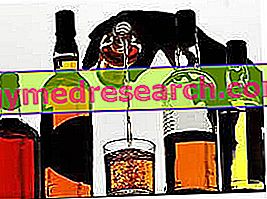Generality
Hormone replacement therapy ( HRT ) is a drug therapy based on the administration of hormones.

Generally, when we talk about hormone replacement therapy (in English, Hormon Replacement Therapy or HRT), we immediately think of the pharmacological treatment to which some post-menopausal patients are subjected, in order to counteract the symptoms and disorders associated with the inevitable decrease in synthesis of female hormones.
In truth, the meaning of hormone replacement therapy is much broader, since this term groups all those pharmacological therapies based on the administration of different hormones.
Indications
When is it necessary to resort to hormone replacement therapy?
The use of hormone replacement therapy is necessary when a patient, for any reason - pathological or physiological - finds himself in a condition in which certain hormones are not produced in the right quantities, leading to the onset of disorders and diseases.
In truth, the use of hormone replacement therapy is not always necessary or indispensable for the patient, unless the lack of hormones negatively affects the quality of life of the patient and / or does not constitute a real danger to his health.
However, among the diseases and disorders that may require the administration of hormone replacement therapy, we recall:
- Pathologies in which there is a reduced synthesis of male or female sex hormones;
- Post-menopausal symptoms and prevention of diseases that may occur following the decline in the production of female sex hormones (for example, osteoporosis);
- Disorders and diseases that decrease thyroid function permanently (as happens, for example, in Hashimoto's hypothyroidism), or temporarily;
- Surgical removal - partial or total - of the toroid (thyroidectomy) due to tumors (thyroid cancer) or other diseases.
- Diseases characterized by insufficient or no production of growth hormone.
Finally, hormone replacement therapy can also be performed in case of sex change, in order to administer to the patient the hormones associated with the sex with which it identifies (testosterone for women who wish to become men and estrogen for men who wish to become women).
Types of TOS
In light of what has been said so far, therefore, we can state that there are different types of hormone replacement therapy that we can summarize as follows:
- Estrogen and progestogen hormone replacement therapy (ie based on female sex hormones); Postmenopausal hormone replacement therapy also belongs to this group;
- Androgenic replacement hormone therapy (ie, based on male sex hormones);
- Hormone replacement therapy based on thyroid hormones ;
- Growth hormone-based hormone replacement therapy .
These types of hormone replacement therapy will be briefly described below.
TOS and Female Hormones
Estrogen and Progestinic Hormone Replacement Therapy
The hormone replacement therapy based on female hormones (estrogens and progestins) is performed in case of reduced synthesis of these same hormones, to prevent or counteract symptoms and disorders that can occur due to a similar deficiency.
The main indications of hormone replacement therapy with female hormones include:
- Female hypogonadism (a condition associated with a reduction in ovarian activity) and other diseases that cause reduced production of female hormones;
- Post-menopausal symptoms and prevention of osteoporosis in menopause;
- Change of sex .
Beyond the symptomatic picture of the aforementioned diseases and disorders (hypogonadism, diseases that cause a decrease in female hormone production and menopausal symptoms), the lack or reduced synthesis of female hormones in a woman can cause: absence of menstruation, loss of hair, reduced breast development, decreased libido, hot flushes and galactorrhoea.
Hormone replacement therapy based on female hormones may include the administration of estrogenic, progestagen or a combination of these two types of active ingredients.
The administration of the aforementioned active ingredients can take place substantially orally (tablets) or transcutaneously (transdermal patches, gels, vaginal creams, etc.).
The choice to undertake hormone replacement therapy based on one or more of the aforementioned female hormones is the responsibility of the physician and depends essentially on the type of disorder, pathology or symptom to be treated.
Post-menopausal HRT
Post-menopausal HRT is most likely the most well-known form of TOS. This type of treatment is carried out in order to compensate for the reduced synthesis of female hormones that occurs in the period following the menopause.
More in detail, hormone replacement therapy is performed in the post-menopausal phase to counteract the onset of hot flushes that can negatively affect the patient's quality of life. At the same time, menopausal HRT can be used to prevent the onset of osteoporosis in suitable patients at high risk of developing this disease.
Post-menopausal hormone replacement therapy can be performed by administering only one active ingredient of an estrogenic nature, or by using in combination an active principle of an estrogenic nature and one of a progestin nature. Among the active ingredients that can be used in this area, we mention estradiol (estrogen) and norethisterone (progestin).
In this regard, we recall that hormone replacement therapy based on estrogens and progestogens can be:
- Combined : when the active principles of an estrogenic and progestinic nature are administered daily together;
- Sequential : when the estrogenic active ingredients are administered in the first days of the therapy cycle and the active progestagens are administered the last 10-12 days of the therapeutic cycle.
Side Effects of TOS based on Female Sexual Hormones
The side effects induced by hormone replacement therapy based on female hormones can be many, among these we remember some of the most common:
- Headache;
- Sinus pain and / or tension;
- Vaginal candidiasis;
- Nervousness and agitation;
- Depression;
- General malaise;
- Weakness;
- Increased body weight.
Please note
Estrogen-only hormone replacement therapy can increase the risk of endometrial cancer ; while estrogen and progestin-based hormone replacement therapy may increase the risk of developing breast cancer .
The relationship between hormone replacement therapy and cancer is still a widely debated topic today. For more information, we recommend reading the dedicated article.
TOS and Male Hormones
Androgenic Substitute Hormone Therapy
The hormone replacement therapy based on male hormones is carried out especially in the case of male hypogonadism, to prevent or combat andropause, to restore the normal level of androgens in men who have lost normal testicular function (for example, due to illness like testicular cancer) and in case of sex change .
Just as female sex hormones are of fundamental importance in women; androgens perform very important functions in the male organism.
In this regard, among the symptoms that can occur in the case of androgen deficiency in humans, we mention: weakness, erectile dysfunction, muscle atrophy, anxiety, depression, reduced bone density and increased fat mass.
The active ingredients most commonly used in the field of androgen replacement hormone therapy are testosterone and its derivatives. The administration of these active ingredients can take place orally, parenterally or transdermally (capsules, solution for injection intramuscularly, gel and transdermal patches).
Side Effects of TOS based on Male Sex Hormones
Among the main side effects that can occur in the case of androgen-based hormone replacement therapy, we recall:
- Alteration of the blood count;
- Mood changes;
- Gynecomastia;
- Hypertension;
- Benign prostatic hyperplasia.
Finally, it is important to remember that with hormone replacement therapy based on testosterone or its derivatives can increase the risk of prostate cancer . For this reason, it is necessary to carry out regular checks and analyzes, in particular, when the TOS is performed to counter the andropause.
TOS and Thyroid Disorders
Hormone Replacement Therapy with Thyroid Hormones
The use of hormone replacement therapy with thyroid hormones is necessary in case of reduced or no functioning of the thyroid .
The hormones produced by the thyroid, in fact, are involved in numerous fundamental biological functions for the organism, such as, for example, brain and skeletal development in the fetus, body growth in children, regulation of glucose metabolism and protein synthesis and the regulation of lipolysis and lipogenesis processes.
Reduced production - and, in the most severe cases, the total lack - of thyroid hormones, can cause a series of symptoms and even serious complications, such as: increased body weight, dry skin and brittle hair, fatigue and muscle weakness, heart rate low, goiter, infertility and myxedema.
Among the hormones that can be used in hormone replacement therapy to make up for the lack of these hormones, we mention levothyroxine sodium (Eutirox®) and liothyronine sodium (Liotir®, Titre®). The intake of these active ingredients compensates, respectively, for the lack of thyroxine (or T4) and of triiodothyronine (T3). Hormone replacement therapy can be performed either by using the aforementioned active ingredients alone or by using them in combination.
The choice to undertake a certain type of hormone replacement therapy with thyroid hormones rather than another (monotherapy with levothyroxine sodium, monotherapy with liothyronine sodium or combination therapy) is the responsibility of the endocrinologist and depends on various factors, such as the type of disease that afflicts the patient and his severity.
However, hormone replacement therapy with thyroid hormones is administered orally (tablets, oral solution, soft capsules and oral drops).
Side Effects of Thyroid Hormone based TOS
Although hormone replacement therapy is carried out with the aim of restoring normal levels of thyroid hormones, it can give rise to several side effects, like any other type of drug treatment.
Among the side effects that could occur during thyroid hormone replacement therapy, we recall:
- Headache;
- Agitation and insomnia;
- Dizziness;
- Palpitations and tachycardia;
- Changes in the menstrual cycle;
- Hyperhidrosis;
- Weight loss.
TOS and Growth Hormone
Hormone Replacement Therapy based on Growth Hormone
Another type of hormone replacement therapy is that based on the administration of growth hormone. This hormone is as important in children as in adults; in fact, its deficiency can cause reduced structural growth in the former and difficulty in concentration, decrease in energy, weakness, cardiovascular disorders, insulin resistance, etc. in the latter.
Growth hormone-based hormone replacement therapy is administered parenterally and is indicated in all those diseases characterized by insufficient production or total lack of the aforementioned hormone.
The main side effects associated with this type of hormone replacement therapy include: water retention, edema, myalgia, arthralgia, paraesthesia, headache and diabetes.



